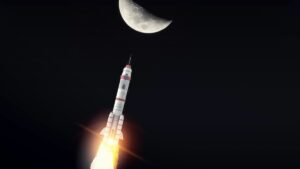The European Space Agency’s next-generation heavy-lift rocket Ariane 6 successfully completed a full dress rehearsal on Thursday, in preparation for its maiden flight next year.
The so-called hot-fire test at Europe’s Spaceport in French Guiana “simulated a complete launch sequence and thus validated the entire flight phase of Ariane 6’s core stage,” said the agency.
During the rehearsal, the rocket engine was ignited while securely mounted to a test stand or test platform. The term ‘hot-fire’ refers to the fact that the engine is fired with its propellants, producing actual combustion and exhaust. The only difference from an actual launch was that the boosters were not ignited — leaving Ariane 6 firmly planted on the launch pad.
“The teams from ArianeGroup, CNES and ESA have now run through every step of the rocket’s flight without it leaving Earth,” explained ESA director general Josef Aschbacher, who declared success means “We are back on track towards resecuring Europe’s autonomous access to space.”
Ariane 6 was first scheduled to launch four years ago. However, the rocket has suffered a series of delays, attributed to technical issues, COVID-19, and design changes. The rocket’s previous hot-fire test, in June, ended in failure.
With its Ariane 6’s predecessor, Ariane 5, officially decommissioned and Italy’s Vega C rocket grounded following launch failure in December, Europe is now without independent access to space satellites.
Until Ariane 6 gets up and running, the EU is forced to contract the work to Elon Musk’s SpaceX — the company’s Falcon rocket is the only viable alternative for hauling large satellites into orbit.
Despite its setbacks, Ariane 6 has a number of institutional launches to carry out, not just for the ESA. It has been attracting commercial contracts, including 18 launches for Amazon’s Kuiper broadband megaconstellation project.
For now, ArianeGroup’s CEO Martin Sion praised the team for the “real industrial feat”, but added that “a few additional tests”, notably fault tolerance, were still needed before the rocket was ready for launch. The next test, of the upper stage, is set to take place this December.






